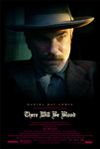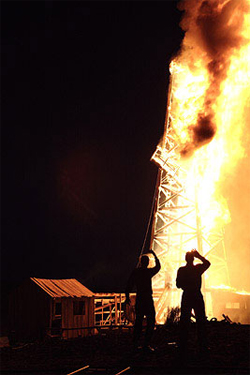2008
Main Movie
Page
Atonement
Boy in the Striped Pajamas
Brideshead Revisited
Counterfeiters
The Dark Knight
Enchanted
Frozen River
Indiana Jones and the Kingdom of the Crystal Skull
Iron Man
Juno
Man on Wire
Michael Clayton
No Country
for Old Men
Rachel Getting Married
the Savages
The Secret Life of Bees
Sweeney Todd
There Will Be Blood
The Visitor
WALL-E
Film
Reviews from 2007
Film Reviews
from 2006
There Will Be Blood
The story follows Daniel Plainview (Daniel Day-Lewis), a self made oil man, who tries to buy up the oil rights in California in the early years of the 20th Century. The majority of the film takes place in the town of Little Boston, where Daniel, accompanied by his young son H.W., drills for oil and buys land. Daniel enters into a deal with the religiously zealous Sunday family. The son, young Eli, is a charismatic preacher of the Church of the Third Apocalypse, looking for money to build a new church for his growing congregation. Eli shrewdly keeps his eye on Daniel to join the church, and, more importantly, finance the new building. The scene in which Eli baptizes Daniel is amazing.
Daniel Plainview is a complex, larger-than-life, character, dominating every scene of the film. He is in the end monstrous in his final encounters with H.W. and Eli. He is always a shrewd businessman, and even shows moments of tenderness toward H.W., when he loses his hearing in an accident. Daniel Day-Lewis’ performance as Daniel is simply magnificent. I think this performance will not only win Day-Lewis his second Oscar, but will become legendary, and cement his reputation as one of the finest actors of his generation. Just watching the depth of intensity in his final scene with Eli in the bowling alley in the basement of Daniel’s mansion is simultaneously horrifying and thrilling. You want to turn away, but can’t. (It’s the only disturbingly violent scene in the film,) There’s so much in There Must Be Blood that I know I
didn’t catch it all in the first viewing, and am eager to see it
again. There is much religious imagery, including the names of
the characters. As I mentioned, Daniel is a complex character,
but so are Eli and the others. It’s a credit to Anderson’s
direction and screenplay that I can’t wait to talk about it with
others, and discuss the scenes and characters. It’s like
a finishing a great novel that you want to tell all your friends about,
so they can read it too. Go see this stunning, fascinating, complex film. I guarantee you’ll want to talk about it, and won’t soon forget it. Tom Condon, OP
|
" It’s like a finishing a great novel that you want to tell all your friends about, so they can read it too."
The USCCB Office for Film & Broadcasting
classification is L -- limited adult audience, films whose problematic
content many adults would find troubling. The Motion Picture Association
of America rating is R -- restricted. Under 17 requires accompanying
parent or adult guardian. |
subscribe to
DomLife.org and receive a free email update every two weeks. unsubscribe |



 There Will Be Blood is a great movie. It’s visually
stunning, with great landscapes of rural California in the early days
of the oil boom. It looks like the big epics we just don’t
see anymore, with a grand scale and a sense of history. It has
great scenes of chugging steam locomotives and gushing oil wells. Writer-director
Paul Thomas Anderson has successfully adapted Upton Sinclair’s
muckraking 1920’s novel Oil! into a film that is both
true to its time, yet remarkably contemporary, with its themes of greed,
power, dysfunctional families and corrupt religious leaders.
There Will Be Blood is a great movie. It’s visually
stunning, with great landscapes of rural California in the early days
of the oil boom. It looks like the big epics we just don’t
see anymore, with a grand scale and a sense of history. It has
great scenes of chugging steam locomotives and gushing oil wells. Writer-director
Paul Thomas Anderson has successfully adapted Upton Sinclair’s
muckraking 1920’s novel Oil! into a film that is both
true to its time, yet remarkably contemporary, with its themes of greed,
power, dysfunctional families and corrupt religious leaders.  Daniel is a man of many secrets. Daniel refuses to discuss his
past with anyone, until a man claiming to be his long lost brother appears. Daniel
also is vague about the whereabouts of H.W.’s mother; in one scene
he says she is dead, in another, he simply refuses to discuss her. Daniel’s
relationship to H.W. is also complex; in one scene he seems to love the
child, in another, he gives him away, in another, he calls H.W. an orphan. Daniel
threatens to slit a man’s throat for asking about H.W. Whatever
Daniel’s past secrets he is a self-proclaimed misanthrope, seeing
no good in others. Their only purpose is to serve Daniel and his
plans for wealth and power.
Daniel is a man of many secrets. Daniel refuses to discuss his
past with anyone, until a man claiming to be his long lost brother appears. Daniel
also is vague about the whereabouts of H.W.’s mother; in one scene
he says she is dead, in another, he simply refuses to discuss her. Daniel’s
relationship to H.W. is also complex; in one scene he seems to love the
child, in another, he gives him away, in another, he calls H.W. an orphan. Daniel
threatens to slit a man’s throat for asking about H.W. Whatever
Daniel’s past secrets he is a self-proclaimed misanthrope, seeing
no good in others. Their only purpose is to serve Daniel and his
plans for wealth and power.